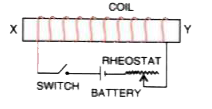Suggest a few useful ways of utilising waste water.
Step-by-Step Solution:
1. Recharging Groundwater:
- Wastewater can be treated and used to recharge groundwater aquifers. This process involves directing the treated wastewater into the ground through recharge wells or infiltration basins, which helps replenish the water table and ensures a sustainable water supply.
2. Irrigation:
- Treated wastewater can be effectively used for agricultural irrigation. This is particularly useful in areas where freshwater resources are scarce. It provides the necessary moisture for crops while also reducing the demand for potable water.
3. Use of Treated Municipal Water:
- After treatment, municipal wastewater can be utilized for non-potable purposes such as watering gardens, parks, and public green spaces. It can also be used for washing vehicles, which helps conserve freshwater.
4. Kitchen Wastewater:
- Wastewater generated from kitchens, such as water used for washing vegetables or dishes, can be reused for flushing toilets. This practice reduces the amount of clean water needed for sanitation purposes.
5. Fertilizer Production:
- Certain pollutants and nutrients present in treated municipal wastewater can be repurposed as fertilizers. This can enhance soil fertility and promote crop growth, making it a sustainable option for agricultural practices.
- Wastewater can be treated and used to recharge groundwater aquifers. This process involves directing the treated wastewater into the ground through recharge wells or infiltration basins, which helps replenish the water table and ensures a sustainable water supply.
- Treated wastewater can be effectively used for agricultural irrigation. This is particularly useful in areas where freshwater resources are scarce. It provides the necessary moisture for crops while also reducing the demand for potable water.
- After treatment, municipal wastewater can be utilized for non-potable purposes such as watering gardens, parks, and public green spaces. It can also be used for washing vehicles, which helps conserve freshwater.
- Wastewater generated from kitchens, such as water used for washing vegetables or dishes, can be reused for flushing toilets. This practice reduces the amount of clean water needed for sanitation purposes.
- Certain pollutants and nutrients present in treated municipal wastewater can be repurposed as fertilizers. This can enhance soil fertility and promote crop growth, making it a sustainable option for agricultural practices.
Topper's Solved these Questions
- MANAGEMENT OF NATURAL RESOURCESBOOK - NCERT EXEMPLAR ENGLISHCHAPTER - MANAGEMENT OF NATURAL RESOURCESEXERCISE - Short Answer Type Questions
7 Videos
- MAGNETIC EFFECTS OF ELECTRIC CURRENT BOOK - NCERT EXEMPLAR ENGLISHCHAPTER - MAGNETIC EFFECTS OF ELECTRIC CURRENT EXERCISE - LONG ANSWER TYPE QUESTIONS
8 Videos
- SOURCES OF ENERGY BOOK - NCERT EXEMPLAR ENGLISHCHAPTER - SOURCES OF ENERGY EXERCISE - LONG ANSWER TYPE QUESTIONS
7 Videos
Similar Questions
Some taps in your locality are left open all day resulting in a tremendous waste of water. Write a letter to the Municipal Commissioner of your town/ city, complaining about the problem. Suggest ways in which this waste of water can be prevented.
View SolutionFig. shows a coil wound around a soft iron bar XY.

Suggest one way of increasing the strength of the electromagnet so formed.
View SolutionThe greater BOD of waste water
View SolutionA : A few toxic substance often present in industrial waste waters undergo biological magnification.
R : A toxic substance can easily be metabolised or excreted by organism.
View SolutionSuggest a few measures for controlling carbon dioxide levels in the atmosphere.
View SolutionSuggest a suitable way to synthesise the following with the help of aldol condensation
(i) 4-phenylbutan-2-ol
View SolutionIn the process of treating sewage and industrial waste waters using air and a biological floc, the sediment obtained is called
View SolutionLimit of BOD prescribed by Central Pollution Control Board for the discharge of industrial and muncipal waste water into natural surface water:
View SolutionDescribe the usefulness of incineration of wastes, and also mention the precautions required in it.
View SolutionWhich of the following is related to integrated waste water treatment process within a natural system?
View Solution
